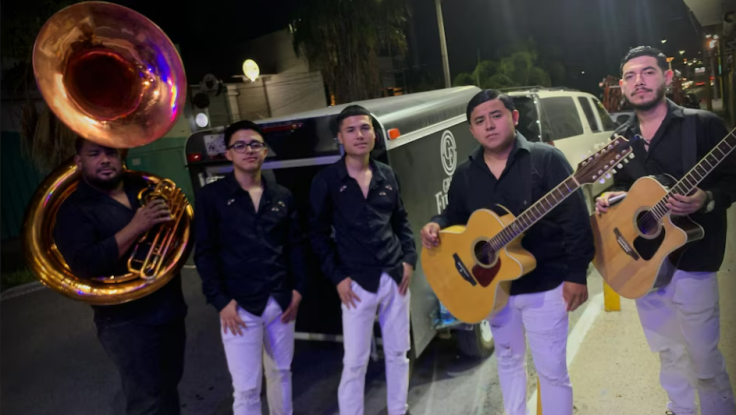
Nearly a week after five members of the regional Mexican band Grupo Fugitivo went missing, their families say they are still waiting for answers — and for confirmation that the charred bodies found by officials on May 28 are, in fact, their loved ones. Authorities said the bodies effectively belong to the band members and have since arrested nine suspects in connection with the case, but relatives say they're still left in the dark.
Family members rejected the authorities' announcement, saying DNA testing has not been completed and the bodies have not been formally identified.
During a Facebook livestream, the mother of Francisco Xavier Vázquez Osorio, one of the missing band members, questioned the prosecutor's statement.
"I want to know why the prosecutor's office says my son is dead," she said. "They don't know if it's him. They don't have my DNA. I haven't seen him. They haven't told us anything, and we're the first ones who need to know."
Family members added that they tried contacting the prosecutor's office for more information but received no response. "They haven't even let us see the bodies. We don't know anything," another relative said during the broadcast.
Familiares de los integrantes de grupo #Fugitivo dicen que no es verdad que los hayan encontrado sin vida, a ellos no les han informado nada, no hay pruebas de ADN. pic.twitter.com/kSqFoaGtg5
— ALERTA EN SALTILLO (@AlertaSLT) May 30, 2025
The families insist the case cannot be considered closed without conclusive forensic evidence or direct communication from authorities. As of Friday, they said they had not received DNA test results or official confirmation from the prosecutor's office.
Shortly before the families went public with their demands, Tamaulipas Attorney General Irving Barrios Mojica said investigators were able to locate the van that had transported the band using surveillance footage and cellphone tracking.
Barrios Mojica and other officials also revealed in a press conference that the bodies were identified based on physical features matching photographs shared by volunteer groups.
But the sister of Livan Edyberto Solís de la Rosa, the band's manager, disputed that claim. She said her brother could not have been identified using those images, as he was the one who usually took the photos for the group's social media and did not appear in them.
"My brother does not appear in any of the pictures because he was behind the camera," she said. "Why do they confirm such things when they haven't even told us?"
Who were the members of Grupo Fugitivo?
The local band was relatively well known in Reynosa and frequently performed at bars, private parties and events. In addition to Vázquez Osorio, the group included Nemesio Antonio Durán Rodríguez, 40; Víctor Manuel Garza Cervantes, 21; and José Francisco Morales Martínez, 23. Solís de la Rosa, 27, served as the group's manager and photographer.
Carlos González, the band's lead singer, was not present when the others went missing. According to local media reports, González was running late as the rest of the band headed to their next gig. When he arrived, they were already gone.
Two days after the group disappeared, authorities located the black GMC van used by the musicians. While no signs of violence were found inside the vehicle, a nearby community reported discovering five charred bodies. Authorities said the physical features of the victims matched those of the missing band members.
Authorities link killings to Gulf Cartel
At Thursday's press conference, Barrios Mojica said investigators believe the killings are linked to a faction of the Gulf Cartel known as Los Metros, led by Ulises Raga Ortiz, alias "El Fayuka."
According to local media, Los Metros have a strong presence in Reynosa and have been tied to other violent crimes in the region.
Authorities said that when they arrived at the ranch where the bodies were discovered, they arrested nine alleged cartel members and seized nine firearms and two vehicles.
Despite the claims made by authorities, relatives of those arrested have challenged the official version of events and denounced abuse, arbitrary detentions and violations of due process.
According to testimonies collected by Milenio, the arrests were carried out by authorities who arrived in unmarked vehicles, did not present arrest warrants, and failed to identify themselves. Family members also alleged excessive use of force during the operations.
One woman said her husband was beaten inside their home and forced to put on tactical clothing.
"My husband was naked. They dressed him like a soldier, the way they were dressed. They shoved me into the bathroom and hit me — I had my daughter in my arms," she said.
Relatives said the detainees work in local auto shops or brickyards and have no ties to organized crime. At least three of those arrested had been employed at the ranch where the bodies were found — a detail the families say is not enough to imply direct involvement in the killings.
As of Friday, neither the state prosecutor's office nor federal authorities had released an official list of the detainees or disclosed any evidence connecting them to the case.
© 2025 Latin Times. All rights reserved. Do not reproduce without permission.






